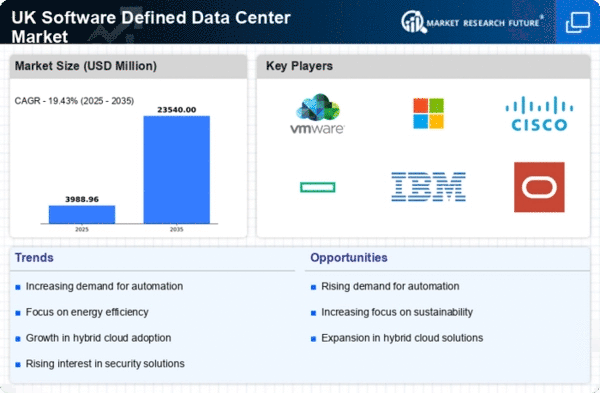Rising Demand for Scalability
The software defined-data-center market is experiencing a notable increase in demand for scalability solutions. As businesses in the UK expand, they require flexible infrastructure that can adapt to changing workloads. This demand is driven by the need for efficient resource allocation and cost management. According to recent data, approximately 60% of UK enterprises are prioritising scalable solutions to enhance their operational efficiency. The ability to scale resources up or down in real-time is becoming a critical factor for organisations aiming to remain competitive. This trend is likely to propel the software defined-data-center market forward, as companies seek to optimise their IT environments and reduce overhead costs.
Shift Towards Energy Efficiency
Energy efficiency is emerging as a pivotal driver in the software defined-data-center market. With rising energy costs and increasing environmental regulations in the UK, organisations are compelled to adopt energy-efficient technologies. The software defined-data-center model allows for better energy management through virtualisation and automation, potentially reducing energy consumption by up to 30%. This shift not only helps in lowering operational costs but also aligns with corporate sustainability goals. As a result, the software defined-data-center market is likely to witness significant growth as companies invest in greener technologies to meet regulatory requirements and enhance their corporate image.
Integration of Artificial Intelligence
The integration of artificial intelligence (AI) into the software defined-data-center market is gaining traction. AI technologies are being leveraged to enhance data management, predictive analytics, and operational efficiency. In the UK, approximately 45% of IT leaders are exploring AI-driven solutions to optimise their data centre operations. This trend indicates a shift towards more intelligent infrastructure that can autonomously manage resources and predict failures before they occur. The potential for AI to streamline operations and reduce downtime is likely to drive further investment in the software defined-data-center market, as organisations seek to harness the power of AI for competitive advantage.
Regulatory Compliance and Data Sovereignty
Regulatory compliance is a critical driver for the software defined-data-center market in the UK. With stringent data protection laws such as GDPR, organisations are increasingly focused on ensuring that their data management practices comply with legal requirements. This has led to a heightened demand for software defined-data-centres that can provide robust security and data sovereignty features. Companies are investing in solutions that allow them to maintain control over their data while ensuring compliance with local regulations. This focus on regulatory adherence is likely to stimulate growth in the software defined-data-center market as businesses seek to mitigate risks associated with non-compliance.
Increased Focus on Disaster Recovery Solutions
The software defined-data-center market is witnessing a growing emphasis on disaster recovery solutions. As businesses in the UK recognise the importance of data resilience, they are investing in technologies that ensure business continuity in the face of disruptions. The ability to quickly recover data and applications is becoming a priority, with studies indicating that nearly 70% of UK organisations are enhancing their disaster recovery strategies. This trend is likely to drive demand for software defined-data-centres that offer integrated disaster recovery capabilities, thereby reinforcing the market's growth as companies seek to safeguard their operations against unforeseen events.

















